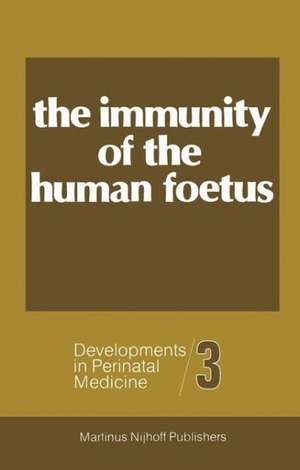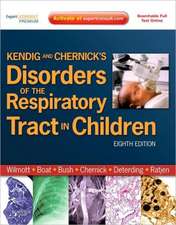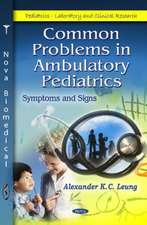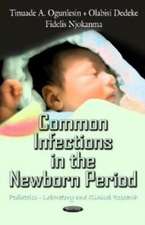The Immunity of the Human Foetus and Newborn Infant: Developments in Perinatal Medicine, cartea 3
Autor Ivo Mileren Limba Engleză Paperback – 12 oct 2011
Preț: 584.26 lei
Preț vechi: 615.02 lei
-5% Nou
Puncte Express: 876
Preț estimativ în valută:
111.81€ • 121.41$ • 93.92£
111.81€ • 121.41$ • 93.92£
Carte tipărită la comandă
Livrare economică 18-24 aprilie
Preluare comenzi: 021 569.72.76
Specificații
ISBN-13: 9789400967779
ISBN-10: 9400967772
Pagini: 260
Dimensiuni: 156 x 244 x 14 mm
Greutate: 0.42 kg
Ediția:1982
Editura: SPRINGER NETHERLANDS
Colecția Springer
Seria Developments in Perinatal Medicine
Locul publicării:Dordrecht, Netherlands
ISBN-10: 9400967772
Pagini: 260
Dimensiuni: 156 x 244 x 14 mm
Greutate: 0.42 kg
Ediția:1982
Editura: SPRINGER NETHERLANDS
Colecția Springer
Seria Developments in Perinatal Medicine
Locul publicării:Dordrecht, Netherlands
Public țintă
ResearchCuprins
Preface.- — what is ontogenesis?.- Ontogenesis of immunity of the human foetus.- Development of the cellular substrate of the immune system.- Development of the lymphatic system.- Synthesis of immunologically active proteins — the complement components and immunoglobulins — in the foetal period.- Complement components.- Immunoglobulin synthesis.- B lymphocytes with surface membrane immunoglobulins.- Transmission of antibodies and immunoglobulins from mother to foetus.- Transplacental transmission of specific antibodies.- Transplacental transmission of immunoglobulins.- Physiological conditions for the transmission of immunoglobulins from mother to foetus.- Mechanism of transplacental transmission of IgG.- Role of the Fc fragment of the IgG molecule and of cell receptors in the transplacental transmission of IgG.- Antibacterial mechanisms of the amniotic fluid.- Ontogenesis of the foetus‘s cellular immunity.- Incidence in the foetus of T lymphocytes forming spontaneous E rosettes.- Functional activity of the T cell system.- Response of foetal lymphocytes to phytohaemagglutinin (PHA) stimulation in vitro.- Proliferative response of foetal lymphocytes to stimulation by allogenic cells in mixed lymphocyte cultures.- Effector activity of foetal lymphocytes — cytotoxicity.- Chronological survey of the commencement of foetal immunocompetence.- Immunity of the physiological neonate.- Natural (nonspecific) neonatal immunity.- Cellular factors of natural neonatal immunity. The function of polymorpho-nuclear (PMN) leucocytes — the inflammatory reaction.- Migratory activity of the PMN leucocytes of newborn infants in vivo.- In vitro migration of the PMN leucocytes of neonates (chemotaxis).- Chemotactic activity of neonatal monocytes.- The neonatal phagocytic system.- Ingestion of particles by neonatal phagocytes. Neonatal serum opsonins.- Antibacterial (bactericidal) activity of neonatal leucocytes.- Activity of the complement system in neonatal serum.- Alternative pathway of activation of complement in neonatal serum.- Cell-mediated immunity in newborn infants.- Delayed hypersensitivity in newborn infants.- Activity of the neonatal T cell system.- T lymphocytes in the blood of newborn infants.- Response of neonatal lymphocytes to stimulation by phytohaemagglutinin (PHA).- Antigenic stimulation of neonatal lymphocytes.- Production of lymphokines by neonatal lymphocytes.- Cytotoxic activity of neonatal lymphocytes.- Transplacental transmission of antigen — sensitization of the foetus.- Transplacental infiltration of lymphocytes.- Specific humoral immunity of the newborn infant and its postnatal development.- Antibody formation and immunoglobulin synthesis.- Effect of passively transmitted maternal antibodies on active antibody synthesis by neonates and older infants.- B lymphocytes with surface membrane immunoglobulins in the blood of newborn infants.- Immunocompetence of neonatal B lymphocytes.- Immunological significance of maternal milk.- Humoral immunity factors in colostrum and milk.- Immunoglobulins.- Antibodies.- Immunologically active cells in colostrum and milk.- Nonspecific factors in maternal milk.- Immunity of the high risk, pathological neonate.- Immunity disturbance of premature and small-for-dates neonates.- Cellular factors of natural (nonspecific) immunity.- Humoral factors of natural immunity.- Cellular immunity.- Immunoglobulins and antibodies.- Rh isoimmunization — the immunological basis of haemolytic disease of the newborn.- Formation of ant-Rh (anti-D) antibodies and their transmission to the foetus.- Effect of hyperbilirubinaemia on the newborn infant’s immunity and the immunosuppressive effect of bilirubin in in vivo and in vitro experiments.- Effect of hyperbilirubinaemia on antibody formation and immunoglobulin synthesis.- Effect of exchange blood transfusion on the newborn infant’s immune system.- Effect of hyperbilirubinaemia on specific cellular immunity.- Effect of bilirubin on factors of natural, nonspecific immunity.- Immunological aspects of perinatal infections.- The immunity of infants with Down’s syndrome.- Natural immunity factors.- Cell-mediated immunity.- Immunoglobulins and antibodies.- References.











